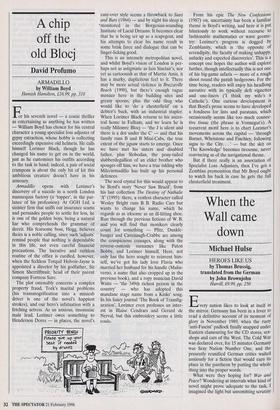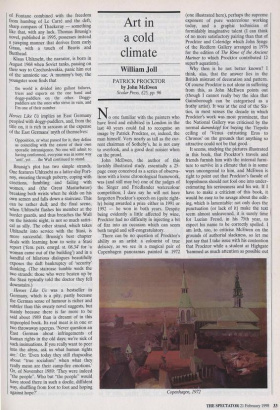When the Wall came down
Michael Hulse
HEROES LIKE US by Thomas Brussig, translated from the German by John Brownjohn Harvill, £9.99, pp. 250 Every nation likes to look at itself in the mirror. Germany has been in a fever to read a definitive account of its moment of glory in November 1989, when the rusty `anti-Fascist' padlock finally snapped under Eastern clamouring for the CD stores, sex- shops and cars of the West. The Cold War was declared over, for 15 minutes Germany was Sexy Nation Number One, and the presently reunified German critics waited anxiously for a fiction that would earn its place in the pantheon by putting the whole thing into the proper words. What were they hoping for? War and Peace? Wondering at intervals what kind of novel might prove adequate to the task, I imagined the light but unremitting scrutiny of Fontane combined with the freedom from humbug of Le Carre and the deft, sharp compass of Thackeray — something like that, with any luck. Thomas Brussig's novel, published in 1995, possesses instead a yawping manner that derives from early Grass, with a touch of Beavis and Butthead.
Klaus Uhltzscht, the narrator, is born in August 1968 when Soviet tanks, passing on their way to Czechoslovakia, panic him out of the amniotic sac. A mummy's boy, the youngster soon finds that
the world is divided into gallant failures, triers and experts on the one hand and doggy-paddlers on the other. Doggy- paddlers are the ones who strive in vain, and I'm one of their number.
Heroes Like Us implies an East Germany peopled with doggy-paddlers, and, from the title on, it is rich in sarcasm at the expense of the East Germans' myth of themselves:
Opposition, or what passed for it, they define as coinciding with the extent of their own sporadic intransigence. No one will admit to having conformed, everyone was in some way `anti', yet . . . the Wall continued to stand.
Brussig's plot has two simple strands. One features Uhltzscht as a latter-day Port- noy, sweating through puberty, coping with erections, fumbling and failing with women, and (the Great Masturbator) breaking both wrists when he skids on his own semen and falls down a staircase. This can be rather dull; and the final scene, when Uhltzscht flashes his member at the border guards, and thus breaches the Wall on the historic night, is not so much satiri- cal as silly. The other strand, which takes Uhltzscht into service with the Stasi, is more successful. Brussig's best chapter deals with learning how to write a Stasi report (`fern. pers. emrgd. st. 08.34' for 'a woman came out of the building') and in a handful of hilarious dialogues beautifully exposes the daft bankruptcy of 'security' thinking. (The staircase tumble weds the two strands: those who were beaten up by the Stasi typically told the doctor they fell downstairs.) Heroes Like Us was a bestseller in Germany, which is a pity, partly because the German sense of humour is richer and subtler than this sweaty novel suggests, but mainly because there is far more to be said about 1989 than is dreamt of in this unpeopled book. Its real meat is in one or two throwaway apergus. 'Never question an East German about infringements of human rights in the old days; we're sick of such insinuations. If you really want to peer into the abyss, ask us what human rights are.' Or: 'Even today they still rhapsodise about "true socialism" when what they really mean are their camp-fire emotions.' Or, of November 1989: 'They were indeed "the people". Who but "the people" would have stood there in such a docile, diffident Way, shuffling from foot to foot and hoping against hope?'



























































 Previous page
Previous page